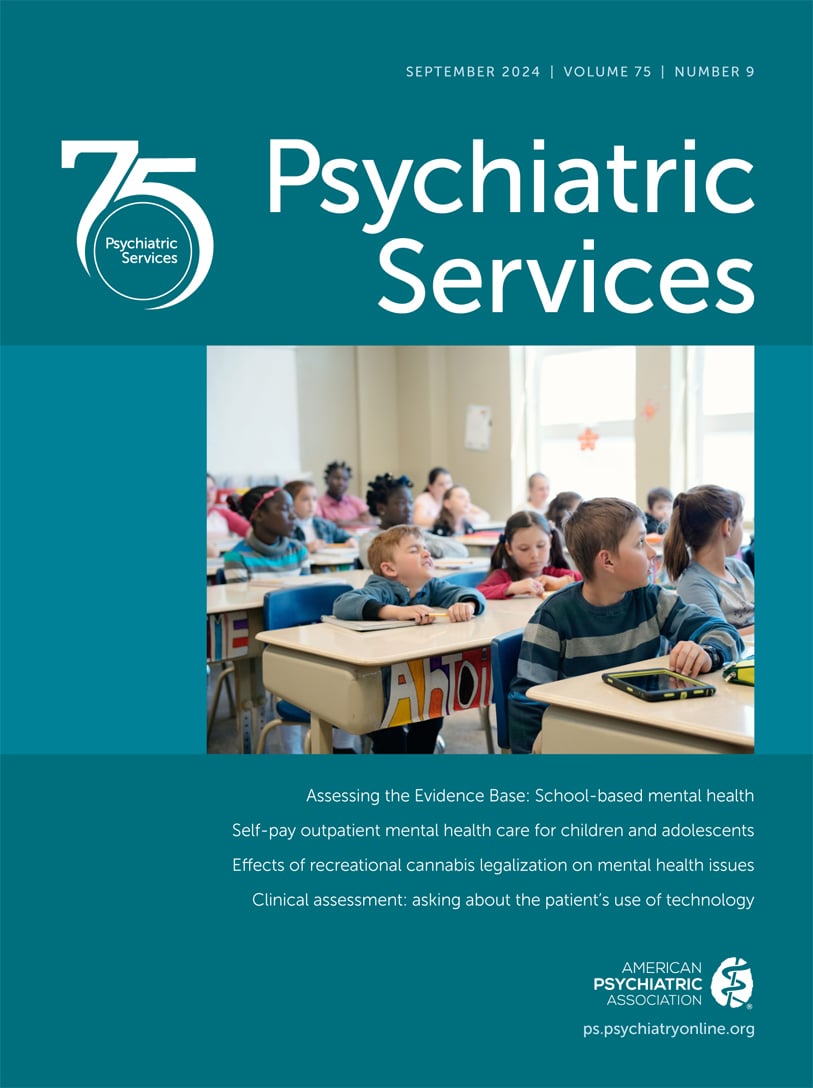Psychiatric Services
- Volume 72
- Number 7
- July 2021
Taking Issue
Viewpoint
Articles
Publication date: 11 May 2021
Pages752–757Objective: Electroconvulsive therapy (ECT) is an effective treatment for major depressive disorder; yet, its use is confined to <1% of individuals with this disorder. The authors aimed to examine barriers to ECT from the perspective of the provider. ...
https://doi.org/10.1176/appi.ps.202000387Publication date: 23 April 2021
Pages758–765Objective: Acetaminophen is a common cause of intentional and inadvertent overdoses among children and adolescents worldwide. Little is known about characteristics and clinical outcomes of these youths. The primary goal of this naturalistic study was to ...
https://doi.org/10.1176/appi.ps.202000081Publication date: 04 May 2021
Pages766–775Objective: The aim was to examine the impact of receipt of mental health services on health care expenditures for U.S. adults with major chronic physical conditions. Methods: Medical Expenditure Panel Survey data for 2004–2014 were analyzed for adults ...
https://doi.org/10.1176/appi.ps.202000161Publication date: 21 May 2021
Pages776–783Objective: Previous studies indicate that patients’ satisfaction with mental health care is correlated with both treatment outcomes and quality of life. The aims of this study were to describe online reviews of mental health treatment facilities, ...
https://doi.org/10.1176/appi.ps.202000267Reviews & Overviews
Publication date: 07 May 2021
Pages784–793Objective: Obsessive-compulsive disorder (OCD) can be a chronic and disabling illness with a lifetime prevalence of 2%, twice that of schizophrenia. Although effective treatments exist, OCD often remains underdetected and undertreated. Methods: The ...
https://doi.org/10.1176/appi.ps.202000296Special Articles
Publication date: 04 May 2021
Pages794–801Although approximately 20% of adults in the United States experience a mental health condition annually, there continues to be a gap in the provision of care because of a shortage of behavioral health providers. The National Council for Behavioral Health ...
https://doi.org/10.1176/appi.ps.202000066Global Mental Health Implementat Ion Science Protocols
Publication date: 18 December 2020
Pages802–811Background: Mental health conditions impose a major burden worldwide, especially in low- and middle-income countries (LMICs), where health specialists are scarce. A challenge to closing LMICs’ mental health treatment gap is determining the most cost-...
https://doi.org/10.1176/appi.ps.202000090Publication date: 09 December 2020
Pages812–821Background: Depression is a leading cause of death and disability worldwide, including in low- and middle-income countries (LMICs). Depression often coexists with chronic medical conditions and is associated with worse clinical outcomes. This confluence ...
https://doi.org/10.1176/appi.ps.202000003Brief Reports
Provision of Collaborative Care Model and General Behavioral Health Integration Services in Medicare
Publication date: 15 April 2021
Pages822–825Objective: The authors sought to describe the early use of collaborative care model (CoCM) and general behavioral health integration (BHI) billing codes among clinicians. Methods: Counts and payments were calculated for accepted and denied claims for ...
https://doi.org/10.1176/appi.ps.202000265Publication date: 06 April 2021
Pages826–829Objective: The authors assessed associations between childhood and adolescent adversity and arrest among individuals with first-episode psychosis (FEP). The authors also sought to determine which domains of adversity had the greatest impact and whether ...
https://doi.org/10.1176/appi.ps.202000238Assessing the Impact of Different Depression Treatment Success Metrics on Organizational Performance
Publication date: 15 April 2021
Pages830–834Objective: The Patient Health Questionnaire–9 (PHQ-9) is commonly used to assess depression symptoms, but its associated treatment success criteria (i.e., metrics) are inconsistently defined. The authors aimed to analyze the impact of metric choice on ...
https://doi.org/10.1176/appi.ps.202000364Social Determinants of Mental Health
Publication date: 18 March 2021
Pages836–839It is well documented that individuals with serious mental illnesses are disadvantaged in their employment, educational attainment, social relationships, family relationships, and other areas, which are all social determinants of health. They are also the ...
https://doi.org/10.1176/appi.ps.202000394Technology in Mental Health
Publication date: 26 March 2021
Pages840–844Obsessive-compulsive disorder (OCD), a disabling psychiatric illness, creates substantial societal burden. Evidence-based treatments, including psychopharmacology and exposure with response/ritual prevention (EX/RP), are often inaccessible. Digital health ...
https://doi.org/10.1176/appi.ps.202000558Research, Community, & Services Partnerships
Publication date: 15 April 2021
Pages845–847This column describes the collaboration among the American Psychiatric Association (APA), American Society of Addiction Medicine, Friends Research Institute, and the National Institute on Drug Abuse to create the Addiction Medicine Practice-Based Research ...
https://doi.org/10.1176/appi.ps.202000390Culture & Mental Health Services
Publication date: 12 January 2021
Pages848–852Awareness of the need for culturally adapted mental health interventions is growing. The authors describe the cultural adaptation of an evidence-based practice (EBP), illness management and recovery (IMR), to the Arab population in Israel. The process ...
https://doi.org/10.1176/appi.ps.202000175Law & Psychiatry
Publication date: 02 June 2021
Pages853–855The New Mexico Supreme Court recently considered whether a trial court had erred in excluding behavioral genetic evidence of a murder defendant’s low-activity monoamine oxidase A (MAOA) gene, which the defendant argued had predisposed him—along with his ...
https://doi.org/10.1176/appi.ps.202100226Integrated Care
Publication date: 23 April 2021
Pages856–858Individuals with serious mental illnesses and poorly managed medical conditions known as serious medical-psychiatric illnesses (SMPIs) are vulnerable to disruptions in care, resulting in poor outcomes. Intensive integrated care management approaches are ...
https://doi.org/10.1176/appi.ps.202000286Editor’s Choice
Past Issues
View Issues Archive
Vol. 75 | No. 12

Vol. 75 | No. 11

Vol. 75 | No. 10
